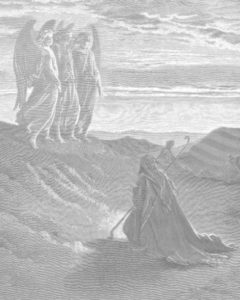
‘Abraham and the Three Angels’ by Gustav Doré
Avraham ben Terach (c. 1813 BCE-1638 BCE) was born in the Sumerian city of Ur (in modern-day Iraq). His father Terach was a wealthy idol merchant, and a minister to the king. According to legend, Abraham’s birth was predicted by the king’s soothsayers, who warned that it would be a bad sign for the monarch. Terach was thus ordered to eliminate the newborn, but couldn’t bring himself to do it, instead abandoning the child in a cave where he was protected and nurtured by an angel until Terach could safely bring him back home. By the age of 3, the young Abraham began to question the idolatrous and immoral society he was born into. Soon enough he had come to the conclusion that there must be one God, and man must strive to be righteous and draw closer to his Maker. By 52, Abraham had gained quite a following, and was a thorn in the side of both the king, and his own idolatrous father. He was put on trial and sentenced to death by fire. It was only at this point that God first revealed himself to Abraham, and miraculously saved him from the flames. Abraham went on to live in Haran (modern-day Syria), where he and his wife Sarah continued to spread the new faith, before permanently settling in the Holy Land. Abraham would become a wealthy and famous shepherd, as well as a popular astrologer, philosopher, and holy man. Rulers and sages from around the world would seek his council. He was undoubtedly most famous for his hospitality, constructing an entryway on each side of his house to make it easy for guests to find him, and providing free meals and lodging for all who were willing to listen to his message. Although naturally a pacifist, Abraham participated in his fair share of battles, including a regional war that engulfed nine different kingdoms, which he ultimately put an end to. It was with him that God first established an everlasting covenant, and promised that his descendants would be innumerable. This is the meaning of his name (“father of multitudes”) and indeed, today some two-thirds of the world’s population claim some form of descent from Abraham, whether biologically or spiritually. The place where he “elevated” his son Isaac would later become the site of the Temple in Jerusalem, the holiest point in Judaism. Abraham is considered the first Jew, and is often attributed with being history’s first monotheist. While there were other monotheists before him, Abraham was certainly the first to spread monotheism widely and combat idolatry head-on. It is said that he wrote a 400-chapter book debunking various idolatrous beliefs and proving that God is One. To him is also attributed the mystical Sefer Yetzirah, “Book of Formation”. He is Judaism’s first forefather, and the start of the chain that climaxed six generations later with Moses and the Israelites being saved from Egypt and receiving the Torah on Mt. Sinai. According to one tradition, Abraham was born and passed away on Rosh Hashanah.
Rosh Hashanah Begins Tonight! Wishing Everyone a Shana Tova u’Metuka!
Words of the Week
We do not inherit the earth from our ancestors; we borrow it from our children.
– Anonymous
